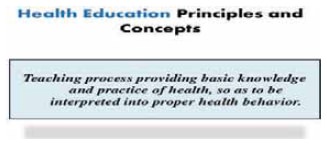Chapter: 11th Nursing : Chapter 10 : Health Education and Audio visual Aids
Principles of health education
Principles of health education

Some basic principles that should be followed in imparting health education.
(It can be summed up using a mnemonics -“MILK CPR LG CSF”)
M : Motivation
I : Interest
L : Learning by doing
K : Known to unknown
C : Credibility
P : Participation
R : Reinforcement
L : Leader
G : Good human relation
C : Comprehensive
S : Setting an example
F : Feed back

Motivation
In every person there
is a fundamental desire to learn. Stimulation or awakening of this desire is
called motivation. The two types of motives - primary and secondary motives.
The primary motives are sex, hunger, survival; these are inborn desires. The
secondary motives are praise, love, rewards, punishment and recognition.
Interest
It is well -known
psychological principle, that unless people are interested, they will not
learn. Health education should therefore relate to the interests of the people.
All health teaching, in order to be effective, must be based on the health
needs of the people.
Learning by doing
Learning is an action
process. The following Chinese proverbs emphasizes the importance of learning
by doing
“IF I HEAR, I FORGET
IF I SEE, I REMEMBER If i do, i know”
Known to unknown
We must always go from
“simple to complex”; from concrete to the abstract, from easy to difficult and
from known to unknown. These are the rules of teaching. One should start
educating people from what they know already and then expose them to new
knowledge.
Credibility
It is the degree to
which the message to be communicated is perceived as trustworthy by the receiver.
It must be based on facts. It must be consistent, compatible with scientific
knowledge and also with local culture, educational system and social goods.
Participation
It means taking part
in or involving oneself or contributing towards something. It is one of the
active principles in learning. It is better than passive learning. Personal
involvement is more likely to lead to personal acceptance.
Reinforcement
Few people can learn
all that is new in a single period. Repetition at intervals is necessary. If
there is no reinforcement there is a possibility that the individual will
forget what is taught.
Leader
We learn a best from
people whom we respect and regard in the work of health education. We penetrate
the community through local leaders. e.g. School teacher, Agents, etc. Leader
understands the needs and demands of the community and provides proper
guidance.
Good human relations
The health educator
must be kind and sympathetic. People must accept him as their real friend. Good
relationships that lead to good communication are of utmost importance in
health education.
Comprehension
In health education,
we must know the level of understanding, education and literacy of the people
to whom the teaching is directed. The teaching should be within the mental
capacity of the people.
Setting an example
The health Education
should set a good example in the things he is teaching. e.g. If he is
explaining the hazards of smoking, he will not be very successful, if himself
smokes.
Feed back
It is one of the key
concepts of the system’s approach. For effective communication, feed back is of
paramount importance.

Related Topics